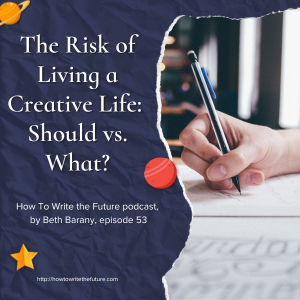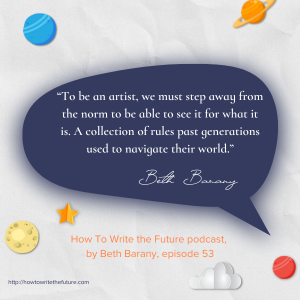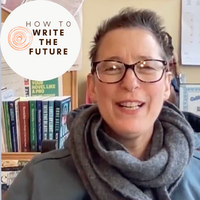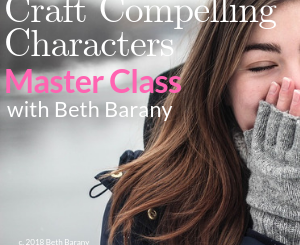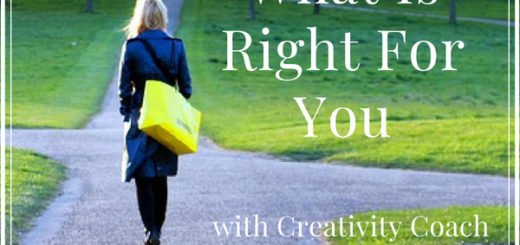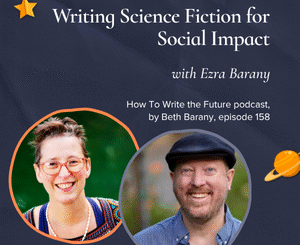The Risk of Living a Creative Life: Should vs. What?
The Risk of Living a Creative Life: Should vs. What? – How To Write the Future, podcast episode 53
“To be an artist, we must step away from the norm to be able to see it for what it is. A collection of rules past generations used to navigate their world.”
In “The Risk of Living a Creative Life: Should vs. What?” host Beth Barany, creativity coach, and science fiction and fantasy novelist shares how to have the courage to step away from your past into a creative new world and shares some actionable steps you can take to follow your dream.
Platforms the podcast is available on Apple Podcasts | Google Podcasts | Buzzsprout | Spotify | Podcast Addict | Amazon Music | Youtube
RESOURCES for The Risk of Living a Creative Life: Should vs. What?
Free World Building Workbook for Fiction Writers: https://writersfunzone.com/blog/world-building-resources/
Sign up for the 30-minute Story Success Clinic here: https://writersfunzone.com/blog/story-success-clinic/
Get support for your fiction writing by a novelist and writing teacher and coach. Schedule an exploratory call here and see if Beth can support you today: https://writersfunzone.com/blog/discovery-call/
Original article on Writer’s Fun Zone blog: https://writersfunzone.com/blog/2017/11/13/versus-risk-living-creative-life/
ABOUT THE HOW TO WRITE THE FUTURE PODCAST
The How To Write The Future podcast is for science fiction and fantasy writers who want to write positive futures and successfully bring those stories out into the marketplace. Hosted by Beth Barany, science fiction novelist and creativity coach for writers.
Tips for fiction writers! This podcast is for you if you have questions like:
- How do I create a believable world for my science fiction story?
- How do I figure out what’s not working if my story feels flat?
- How do I make my story more interesting and alive?
This podcast is for readers too if you’re at all curious about the future of humanity.
Transcript for The Risk of Living a Creative Life: Should vs. What?
Are you looking for a way to dig into your world building for your story?
Then I recommend that you check out my World Building Workbook for Fiction Writers. Now available.
It’s at How To Write The Future.com.
Just head on over there. Click, sign up. Put your name and email, and there you go.
That workbook will be delivered to your inbox straight away.
Hey everyone, Beth Barany here for How To Write The Future podcast. The focus of this podcast and the focus of my work is to support science fiction and fantasy writers to create positive, optimistic futures. Because when we vision what is possible, we help make it so.
This podcast is also for anyone who cares about the future and who cares about making the world a better place for future generations.
Welcome to my 53rd episode. I am working on this episode from Ottery St. Mary and Devon County in the UK, where I am visiting family for the last week or so.
This week’s episode is actually something I wrote and recorded a few years ago in 2017, in fact, five years ago. But the material still holds a hundred percent.
Being a creative is challenging. And it is a beautiful challenge.
The Beautiful Challenge
Over the last few years, I have been working on taking a stand for living a creative life in all areas of my life.
I believe for the world to be better for current and future generations, we need to learn how to be creative in all areas of our life, especially in areas that affect the day-to-day.
I’m talking about not just our stories, but in the way we go about living our daily lives and in the way we have constructed those daily lives; the way cities are planned; the way roads are laid out; the way our electrical grid works; the way we construct houses; the way we get from here to there. Everything. The way we create our clothing, the way we spend money, the way we make money.
The world is in a big place of upheaval and will be so for another few years, And I think with our skills of being creative and allowing ourselves to really go to that edge of the unknown is really going to help us shape the future.
I take a stand for exercising our creative muscle and leaning into the creative process and all that it entails.
So I hope that this episode will inspire you to be brave and to be courageous, and to gently, gently allow yourself to be more and more creative every day in your art; in your work, and in your everyday life.
All right. I hope you enjoy this episode.
Please subscribe, like, comment, leave a review on wherever you listen to your podcasts. I so appreciate it.
And I will drop in at the very end to say a few words as well.
All right.
Should vs. What?
Should versus what the risk of living a creative life.
We are social creatures and learn how to be so by copying our parents and then later our peers. Over the years and actually starting quite young, we develop a sense of the rules of our family culture then our wider culture. All the should and the should nots.
If you follow the rules, you get rewarded, praise, then grades. Then later they say an income and a steady job.
If you don’t follow the rules, you get punished or worse, shamed and denigrated and threatened with expulsion from the group.
But what if what you want to do isn’t supported by the group should?
What if you want to walk the unbeaten path, the riskier route?
What if you want to color outside the lines?
Who’s there to guide you?
No one.
Except other independent types, but they’re all walking their own paths. No one can walk your path. It’s yours alone. Yet the price is high, right?
We’re programmed from early days to do what’s safe and expected and done.
And we’re told it’s bad or wrong or unsafe to stray.
As an artist though, what is there to do if your instincts pull you far away from what’s expected from all the shoulds, away from the groupthink?
To be an artist, we must step away from the norm to be able to see it for what it is. A collection of rules past generations used to navigate their world.
But your world is no longer the world of your parents and ancestors. Mine neither.
It’s scary to dare to do something different. But what if you can’t help it? What if that’s just the way you’re wired?
The challenge for me, and I see this in my students and clients, is to have the courage to see the shoulds for what they are: hand-me-downs from the past, and to evaluate what really works for us now today.
One of the ways I uncover what I think versus what has been handed down to me is I notice what I’m saying to myself, especially noting if I use the word should. I notice how using should makes me feel. Often I feel unhappy. I feel as if I’m in a cage as if I have limited options. I’m tentative and say to myself, oh, no, I couldn’t do that, or I shouldn’t do that.
Another internal voice whispers. Why not? And I have no good reply. I just feel small and scared like a mouse stuck in its safe home because a big, scary cat is out there waiting for me to leave my home. If I do, it’ll pounce on me. These are all the clues to me that I’m in a should box. When I notice this, I do a few things.
First, I breathe in and out compassion for myself and the situation that provoke the shoulds.
Then I recognize that it’s normal to be here, locked in by the unconscious programming from my past that has helped keep me safe as it did my ancestors. So I bless my ancestors and recognize that they chose their fate.
Now, I have an opportunity to choose my fate, and at each step of the way.
Next, I ask myself what would I like.
And I sit in the empty nothingness before the answer arises. It could be a long time before the answer comes. So it’s best to get comfortable with the discomfort of not knowing.
There’s a lot of not knowing as an artist, and that’s okay.
The quicker you become comfortable with this discomfort, the quicker you can sink deeper into the compost of creative gestation.
Stuff is happening, you just can’t see it because it’s happening in the dark.
The next thing I do after sitting in the dark nothingness is I take action, whatever action I can in the smallest steps I can toward my big dream.
In my case, my reoccurring big dream is to be a writer.
So I write, I write anything and everything in my journal, and work on whatever project I deem important. I can write articles, great. Write for 10 minutes. I can edit my novel. Great. I can do that for 20 minutes. I’m dabbling on a TV script. Great. I can play with that for 15 minutes.
Does it mean my work is perfect and matches some external factor of success? No, it doesn’t. The big picture of being a writer who is well regarded sells well, and is read widely, is important to me. I love all those things, but I can’t control any of them. All I can control today is today’s writing, today’s steps.
It’s a relief actually, to only focus on today.
Like stringing together a longer necklace, I know that today’s actions will feed into the rest. At some point, I’ll have another complete body of work to reveal to the world.
Your Turn
Your turn. A recap.
Number One: Notice when you’re in a should cage.
Number Two: Choose anew. What would you like and sit in the uncertainty until a clear answer develops?
Maybe quickly, maybe not.
Number Three. Take small, doable actions that aren’t grandiose but are simple, satisfying, mundane and the real work of being a creative.
Do comment and let me know what you discovered or uncovered in this exercise in noticing your shoulds and what else could be.
Thanks for listening everyone.
I just want to say that this material first showed up on my blog, Writers Fun Zone, and then I recorded it for my Sound cloud account, which is not active anymore. So, if you have been following me for a long time, that’s why this material looks familiar.
Again, I would love to hear what are your small doable actions that you’re taking.
And what did you discover or uncover in this exercise? What are your shoulds? And what would you really, really like?
Have a fabulous, fabulous week. I look forward to connecting with you next time in our next How To Write The Future episode.
Thanks for playing!
Thank you so much, everyone, for listening to my podcast. Your interest and feedback is so inspiring to me and helps me know that I’m helping you in some small way.
So, write long and prosper.
***
Are you stuck and overwhelmed by world-building?
Then check out my new World Building Workbook for Fiction Writers.
Head over to HowToWriteTheFuture.com and sign up for yours today.
Loved this episode? Leave us a review and rating here: https://www.buzzsprout.com/2012061
ABOUT BETH BARANY
Beth Barany teaches science fiction and fantasy novelists how to write, edit, and publish their books as a coach, teacher, consultant, and developmental editor. She’s an award-winning fantasy and science fiction novelist and runs the podcast, “How To Write The Future.”
Learn more about Beth Barany at these sites:
Author site / Coaching site / School of Fiction / Writer’s Fun Zone blog
CONNECT
Contact Beth: https://writersfunzone.com/blog/podcast/#tve-jump-185b4422580
Email: beth@bethbarany.com
LinkedIn: https://www.linkedin.com/in/bethbarany/
CREDITS [H2]
EDITED WITH DESCRIPT: https://www.descript.com?lmref=_w1WCA
MUSIC: Uppbeat.io
DISTRIBUTED BY BUZZSPROUT: https://www.buzzsprout.com/?referrer_id=1994465
SHOW PRODUCTION BY Beth Barany
SHOW NOTES by Kerry-Ann McDade
***
For more “How To Write the Future” episodes, go here.
If you’d like to invite Beth onto your podcast, drop her a note here.

